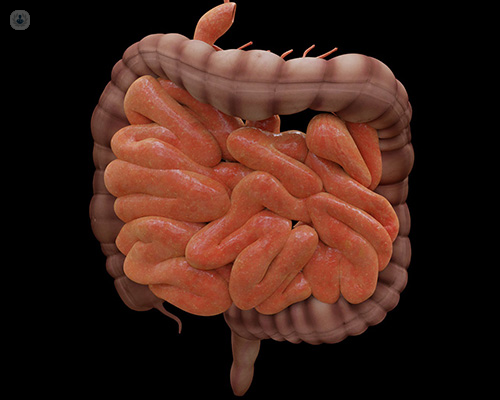The lesser known bowel exam: a flexible sigmoidoscopy
Written by:A flexible sigmoidoscopy is an investigative test to assess the lower bowel and allows the specialist to view the actual lining of the bowel. It is performed endoscopically and may be used to investigate possible cases of polyps, inflammatory bowel disease (IBD), and cancer.
This test is often performed if a patient presents with unexplained changes in bowel habits, abdominal pain, bleeding, or weight loss. Mr Tariq Ismail, a leading colorectal surgeon, gives us an overview of what exactly a flexible sigmoidoscopy involves.

Do you have to prepare before having a flexible sigmoidoscopy?
Before any test, you will be given written instructions about what to expect and how to prepare. A flexible sigmoidoscopy may be performed with either sedation or an anaesthetic, so if you are having these you will need to stop eating for a period beforehand. Additionally, you will normally have an enema 60 minutes before the test to clear the lower section of the bowel.
What does a flexible sigmoidoscopy involve?
The flexible sigmoidoscope is a long, flexible tube with a light and camera on the end of it. It is inserted through the anus to view the lower bowel. Images are transmitted to a screen, which the specialist assesses throughout the procedure. If you are not under anaesthesia or sedation, you can ask to watch this screen, too, if you wish. A flexible sigmoidoscope can also take biopsy samples, too, if needed. These may be taken if abnormal tissue growth is suspected. It can also remove growths, known as polyps, using special tools passed through the device.
Are there any potential risks?
Flexible sigmoidoscopies are performed a lot and are known to be very safe, with few potential complications. There is a very low risk of bowel perforation (tear) when having a flexible sigmoidoscopy.
Additionally, if polyps are removed or biopsies are taken, some bleeding can occur, however, this is minor and will either stop on its own or require treatment to stop the bleeding with injection or heat probe (through the sigmoidoscope). If anaesthesia or sedation are used, these have their own set of risks associated with them, including problems related to breathing, heart rate, and blood pressure, however, these can be quickly treated.
If you experience bleeding or severe pain after you have returned home from your procedure, contact your doctor, GP, or emergency service for advice.
What happens after having a flexible sigmoidoscopy?
This procedure only takes 20 minutes, and afterwards it is normal to experience some bloating and to have wind-type pain, which resolves quickly. You will receive results immediately following the procedure from the specialist. If biopsies are taken, then these need to be analysed in a laboratory by a pathologist. Results from this usually take a few days to be available.
If you are in need of a bowel exam and want a consultation with Mr Tariq Ismail, you can go to his Top Doctors profile and schedule a visit.


